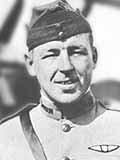Elliot
Springs


Name: Elliot White
Springs
Country: United States
Rank: Captain
Service: United States Air Service
Units: 85 (RFC) 148th Aero (USAS)
Victories: 16
Date Of Birth: July 31, 1896
Place of Birth: Fort Mill, South Carolina
Date Of Death: October 15, 1959
Place of Death: U/A
The son of Colonel Leroy Springs, a wealthy textile
manufacturer, Elliot Springs attended the Culver Military Academy
and Princeton. He enlisted in the army in 1917 and was sent to
England for training with the Royal Flying Corps. In 1918, he was
one of several pilots hand picked by William Bishop to fly the
S.E.5a with 85 Squadron in France. After recovering from wounds
received in action on June 27, 1918, he was reassigned to the
148th Pursuit Squadron which was still under the operational
control of the RFC. When the war ended, Springs returned to the
United States where he barnstormed while writing "Warbirds: The
Diary of an Unknown Aviator." His book was largely based upon a
collection of letters written by his friend, John McGavock Grider,
who was killed in action while serving with 85 Squadron. "Warbirds"
was a best seller and Springs continued writing books based on his
experiences during World War I. At his father's request, he
returned to work at the family textile business in 1931. Recalled
to active duty in 1941, Springs served with the United States Army
Air Corps during World War II.
Distinguished Flying Cross (DFC)
"On August 3, 1918, whilst leading his patrol, which was escorting
DH9s to Bruges, this officer shot down in flames three Fokker
biplanes which were diving on the DHs and succeeded in driving off
the rest of the EA and escorted the bombers safely back to our
lines. On the morning of 22 August 1918, he attacked five Fokker
biplanes, one of them he shot down which was seen to crash in a
wood south of Velu. He engaged another EA and sent it down out of
control and immediately turned to attack another which he drove
east. Having shot away all his ammunition, Lieutenant Springs
pulled out of the fight. On the afternoon of August 22, 1918, he
engaged three Fokker biplanes that were diving on a lower flight.
One of the three pulled out of his dive; another turned east and
the third Lieutenant Springs shot down out of control. It was last
seen by one of the patrol diving into the ruins of Bapaume.
Lieutenant Springs has been on active service in France since May
22, 1918. He has destroyed five EA and driven down out of control,
two. This officer has at all times shown the greatest
determination and courage and his work as Flight Commander in this
squadron has been marked by a rare combination of cool judgement
and most aggressive fighting tactics." DFC citation, London
Gazette, 1918
Distinguished Service Cross (DSC)
"For extraordinary heroism in action near Bapaume, France on
August 22, 1918. Attacking three enemy planes (Fokker type) who
were diving on one of our planes, Lt. Springs after a short and
skilful fight, drove off two of the enemy and shot down the third.
On the same day, he attacked a formation of five enemy planes
(Fokker type) and after shooting down one plane was forced to
retire because of lack of ammunition." DSC citation
